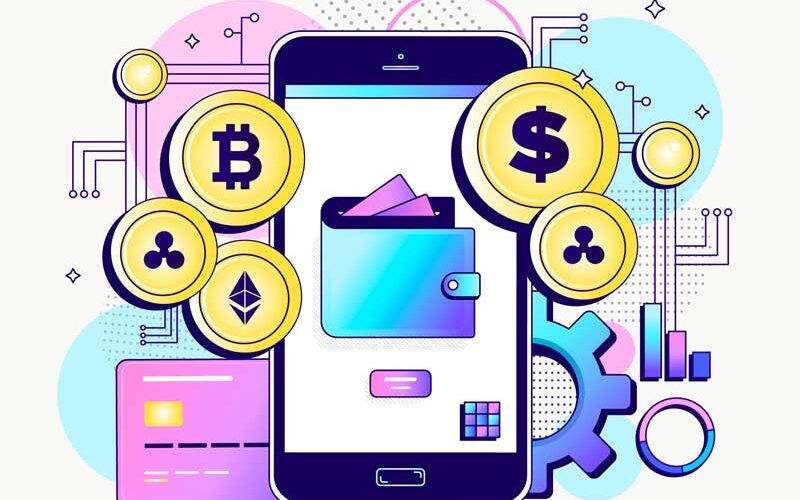What is digital currency?
Most countries’ financial systems rely on electronic versions of currency, which are currencies that exist only in electronic form. Digital currency, on the other hand, is different from electronic currency in that it never physically materializes. Unlike the electronic record of currency holdings that can be converted into physical money through an ATM, digital currency remains solely within a computer network and is exchanged digitally. Digital currency comes in three primary forms: cryptocurrency, stablecoins, and central bank digital currencies (CBDCs), with blockchain technology being the most prevalent distributed ledger used by digital currencies. According to CoinMarketCap, there are currently over 9,000 types of cryptocurrencies available (Rodeck, 2021).
Types of digital currency
・Cryptocurrencies
Cryptocurrencies are a type of digital currency that relies on cryptography to validate and secure transactions within a network, and the creation of these currencies is also managed and controlled through cryptography. Bitcoin and Ethereum are among the best-known examples of cryptocurrencies. The regulatory status of cryptocurrencies can vary depending on the jurisdiction in which they are used.
・Virtual currencies
Virtual currencies are digital currencies that are not subject to government regulations and are overseen by developers or an organization composed of stakeholders. Additionally, they can be controlled through an algorithmic network protocol. One instance of a virtual currency is a token used in a gaming network, which has its economics determined and managed by developers.
・Central Bank Digital Currency
Central bank digital currencies (CBDCs) refer to digital currencies that are regulated and issued by a country’s central bank, and they may either complement or replace traditional fiat currencies. CBDCs differ from fiat currencies in that they only exist in digital form, whereas fiat currencies can exist both in physical and digital forms. Several countries, such as England, Sweden, and Uruguay, are contemplating the possibility of introducing a digital version of their fiat currencies (Frankenfield, 2019).
How does Cryptocurrency work?
Cryptocurrencies operate on a decentralized public ledger called a blockchain, which is a continuously updated record of all transactions maintained by currency holders. The process of creating units of cryptocurrency is called mining, in which complex mathematical problems are solved using computer power to generate coins. Cryptocurrency can be purchased from brokers and stored in cryptographic wallets for spending. The ownership of cryptocurrency does not involve physical possession of anything tangible; instead, it involves possession of a key that enables the transfer of a record or a unit of measure from one person to another without the involvement of a trusted intermediary. Despite Bitcoin’s existence since 2009, the adoption of cryptocurrencies and blockchain technology in finance is still in its nascent stages, with further applications expected to emerge in the future. Eventually, transactions involving financial assets such as bonds and stocks may be executed using this technology (Kaspersky, 2022).
Benefits of digital currency
Despite the inherent concerns, digital currency offers various advantages that might lead to the creation of a US CBDC, including the simplification of online transactions, cross-border payments, and consumer access to funds. The majority of cash is now kept in commercial banks, which are susceptible to economic changes as seen by the 2008 financial crisis, making it impossible to hold money in a highly liquid and secure manner. This is where a CBDC might provide an additional advantage. Therefore, a central bank’s digital currency could provide an alternative option for individuals to safeguard their funds outside of traditional bank accounts. Nevertheless, it’s crucial to note that a CBDC would not be similar to existing cryptocurrencies since it would not be anonymous or decentralized, which are the primary reasons why people are attracted to cryptocurrencies. Depending on one’s perspective, this could be a positive or negative aspect (Town, 2022).
The future of digital currency
More than half of the central banks representing the majority of the global GDP are currently exploring the possibility of implementing digital currencies, according to the Bank of International Settlement. The Economist has reported that the European Union is aiming to introduce a virtual euro by 2025, while the UK has established a task force and the US, being the global financial leader, is developing a hypothetical e-dollar. Central banks in the Asia-Pacific region, including China, Japan, Singapore, Hong Kong, and Thailand, are also actively investigating the use of digital currencies. By experimenting with new technology, central banks are gathering valuable insights to develop the next generation of market infrastructure that will incorporate wholesale and retail CBDC and Securities Settlement. The adoption of Central Bank Digital Currencies will hinge on regulatory frameworks; however, we believe that the pertinent question is not if CBDCs will be adopted but rather when they will be introduced (Academy of technology, 2022).
Reference
Academy of technology, I. (2022). The Future of Digital Money. [online] IBM Blog. Available at: https://www.ibm.com/blog/the-future-of-digital-money/ [Accessed 24 April 2023]
Frankenfield, J. (2019). Digital Currency. [online] Investopedia. Available at: https://www.investopedia.com/terms/d/digital-currency.asp [Accessed 23 April 2023]
Kaspersky (2022). What is cryptocurrency and how does it work? [online] www.kaspersky.com. Available at: https://www.kaspersky.com/resource-center/definitions/what-is-cryptocurrency [Accessed 24 April 2023]
Rodeck, D. (2021). Digital Currency: The Future Of Your Money. [online] Forbes Advisor. Available at: https://www.forbes.com/advisor/investing/cryptocurrency/digital-currency/ [Accessed 23 April 2023]
Town, P. (2022). The Future of Money: Will Digital Currency Replace Paper Money? [online] Rule #1 Investing. Available at: https://www.ruleoneinvesting.com/blog/investing-news-and-tips/digital-currency-replace-money/ [Accessed 24 April 2023]
